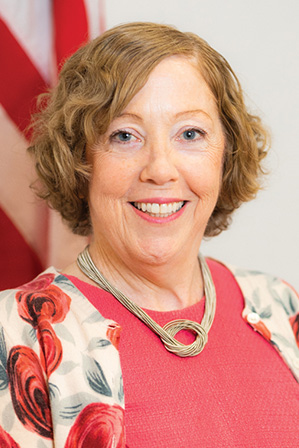All Diplomacy Is (Eventually) Local
Where We Stand
BY JULIE NUTTER

The role of the Foreign Service in maintaining U.S. global leadership has been a constant theme in AFSA’s messaging—a point that former AFSA President Barbara Stephenson made tirelessly to public audiences, to Congress and to our members.
We know that nine in 10 Americans support U.S. global leadership. We also know this support comes with caveats, such as a strong preference for America acting with allies, weak support for “forever” wars and doubts about America’s role as the world’s policeman.
In addition, even though domestic support for free trade agreements has been growing, according to a May 10 report from the Pew Research Center, there is worry that the economic benefits of U.S. global leadership are not felt evenly across the country.
In 2018 the John Glenn College of Public Affairs at Ohio State University teamed up with the Carnegie Foundation to produce U.S. Foreign Policy for the Middle Class— Perspectives from Ohio, the first in a series of reports on local attitudes toward foreign policy.
The Ohio study showed sharp variation in how communities viewed foreign policy, depending on how well their towns and cities are doing and whether they feel left behind by global changes.
The report’s executive summary states: “U.S. national security and foreign policy professionals in Washington, D.C., and worldwide strive to sustain U.S. global leadership. Their international economic, trade, commercial, defense, aid and other foreign policies aim to promote macroeconomic growth and stability and to deliver maximum aggregate benefits for the nation. But many people at the state and local levels are unclear on what all this activity actually entails or how it helps their communities prosper. This should be a major goal of foreign policy professionals— to explain the benefits of U.S. global leadership to all” (italics mine).
These findings suggest that we can no longer take for granted Americans’ support for U.S. global leadership. We need to make the case to our fellow Americans in new and respectful ways and keep a close eye on how our messaging is landing.
AFSA will continue to reach into U.S. communities to explain how the Foreign Service keeps threats at bay while keeping America prosperous and moving forward.
The Carnegie study recommends that “every relevant strategy document, including the National Security Strategy, should explicitly answer this question: Whose interests are being served, and who may lose out?”
The authors are not recommending that foreign policy be decided on domestic political grounds, but that policymakers should understand and recognize the domestic effects of foreign policy decisions more deeply than before. Important food for thought.
Luckily, there are influential voices in support of the value of U.S. global leadership and diplomacy to U.S. communities. At the U.S. Global Leadership State Summit on June 17, Tara Hogan Charles of Procter & Gamble, whose world headquarters is in Cincinnati, said: “Not only is investing in global development and diplomacy the right thing to do, it also makes great business sense for American companies. When we engage with the 95 percent of the world’s consumers who live outside of our borders through so many of our overseas programs, we increase exports. We are helping to grow businesses right here in Ohio and across the country.”
We also have congressional champions who understand how their states and the country benefit from U.S. global leadership. They have beaten back years of proposed budget cuts, convinced that the country is better off when the United States is setting the global agenda. They have sponsored legislation like the “Championing U.S. Business through Diplomacy” and the BUILD Act.
Retired members of the Foreign Service, including those in the AFSA Speakers Bureau, generously volunteer their time to tell the story of the Foreign Service in their communities.
AFSA has some new tools to help in the effort. A new animated video, “What Diplomats Do and Why It Matters,” focuses on economic diplomacy. A companion packet with talking points, articles and discussion questions helps members share this message. A second video and plans for a new edition of the ever-popular Inside a U.S. Embassy are in the works.
Our new president, Ambassador Eric Rubin, considers outreach a top priority. Along with our strategic partners like the U.S. Global Leadership Coalition and our supporters in Congress, AFSA will continue to reach into U.S. communities to explain how the Foreign Service keeps threats at bay while keeping America prosperous and moving forward.

